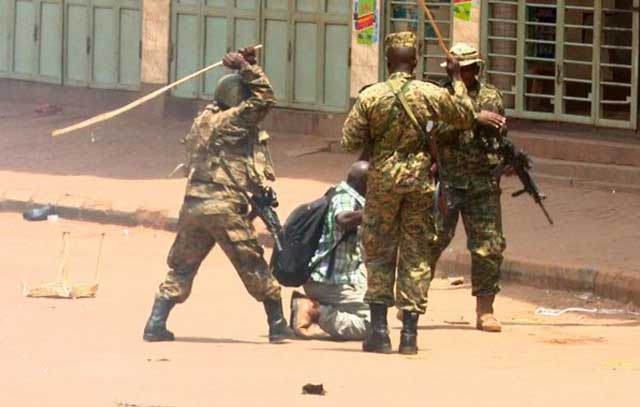
20 journalists in Uganda especially those covering opposition politicians have been assaulted by security personnel
Kampala, Uganda | MUBATSI ASINJA HABATI | Civic space in Uganda is sliding to the lowest level ever as some elements of the UPDF serving under the Military Police, descended on journalists covering former presidential candidate Robert Kyagulanyi as he delivered his petition to the office of the United Nations Human Rights Commission (UNHRC) in Kampala on Feb.17.
Eye witness accounts show that the journalists had gathered a few meters away from the UNHRC offices on the instructions of the police when two military patrol cars pulled up and the commanding officers ordered for the indiscriminate beating of journalists using batons.
“Without warning the men in military police uniform attacked everyone in their sight. A female journalist, who could not run for safety, was beaten like a snake. It was brutal,” a witness said. In total 10 journalists were injured with deep cuts on the heads, backs, feet and other bodily injuries.
The victims of the military police assault included: John Cliff Wamala and Geoffrey Mwesigye both of NTV, Irene Abalo of Daily Monitor, Josephine Namakumbi, Sabiti Joseph and Kitimbo Thomas of NBS TV, Timothy Murungi and Henry Ssekanjako both from New Vision, Alice Naluggya (BTM), Nicholas Bamulanzeki (Sanyu FM) RashidaNakayi (Galaxy FM), Lawrence Kitatta and Shamim Nabakooza of Record TV among others.
The television and social media images of the brutality against journalists armed with pens and cameras caused uproar in the country and beyond.
“We condemn this act of violence meted against journalists who were doing their work as guaranteed under Article 29 of the Constitution of Uganda. Covering opposition politicians should not be regarded as a crime against journalists. We appeal to security agencies to appreciate the role of the media in information dissemination,” Robert Ssempala, the Executive Director of Human Rights Network for Journalists (HRNJ) Uganda, said.
Shamed of the actions of their men in uniform, the UPDF Chief of Defence Forces, Gen. David Muhoozi, mumbled some apology on Feb.18. Gen. Muhoozi said the UPDF would take care of the medical bills of the injured journalists. That was it. But some analysts are not satisfied with the apology from the UPDF because the military and police brutality against journalists in Uganda has continued unabated for long.
“Nobody should get tired of our apology when something wrong has happened. We are human and that means mistakes are bound to happen again. No UPDF personnel is supposed to torture or beat anyone, that is illegal and if caught they will be tried in courts of law,” says Deo Akiiki, the deputy spokesperson of UPDF.
In most cases, the individual officers who commit these crimes against journalists are not punished or if they are punished, it’s always not a deterrent punishment they receive.On Feb.18 the soldiers who were involved in the clobbering of journalists were hurriedly court martialled and sentenced to between 60 and 90 days imprisonment in Makindye Military barracks. Some Ugandans appeared not satisfied with the punishment.
“This punishment of 90 days ina military barracks detention is like house arrest. I am disappointed,” said Collines Mayambala on his Facebook page.
 The Independent Uganda: You get the Truth we Pay the Price
The Independent Uganda: You get the Truth we Pay the Price



Doing under whose command?
Under their own command. They were deployed to assist in keeping law and order, not to beat up people. That is the reason those found culpable were individually charged.
They supposed to law and order but not destroy